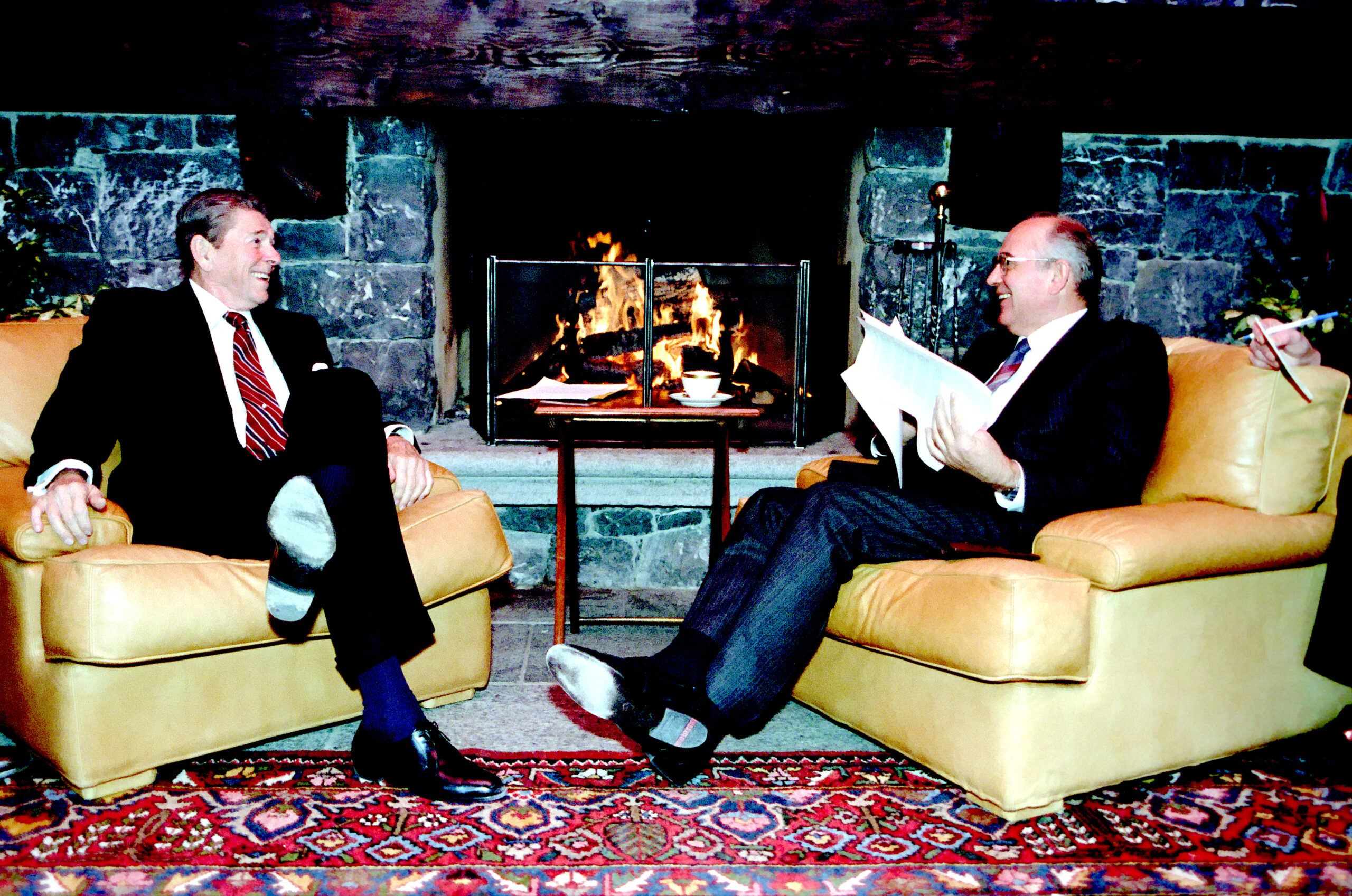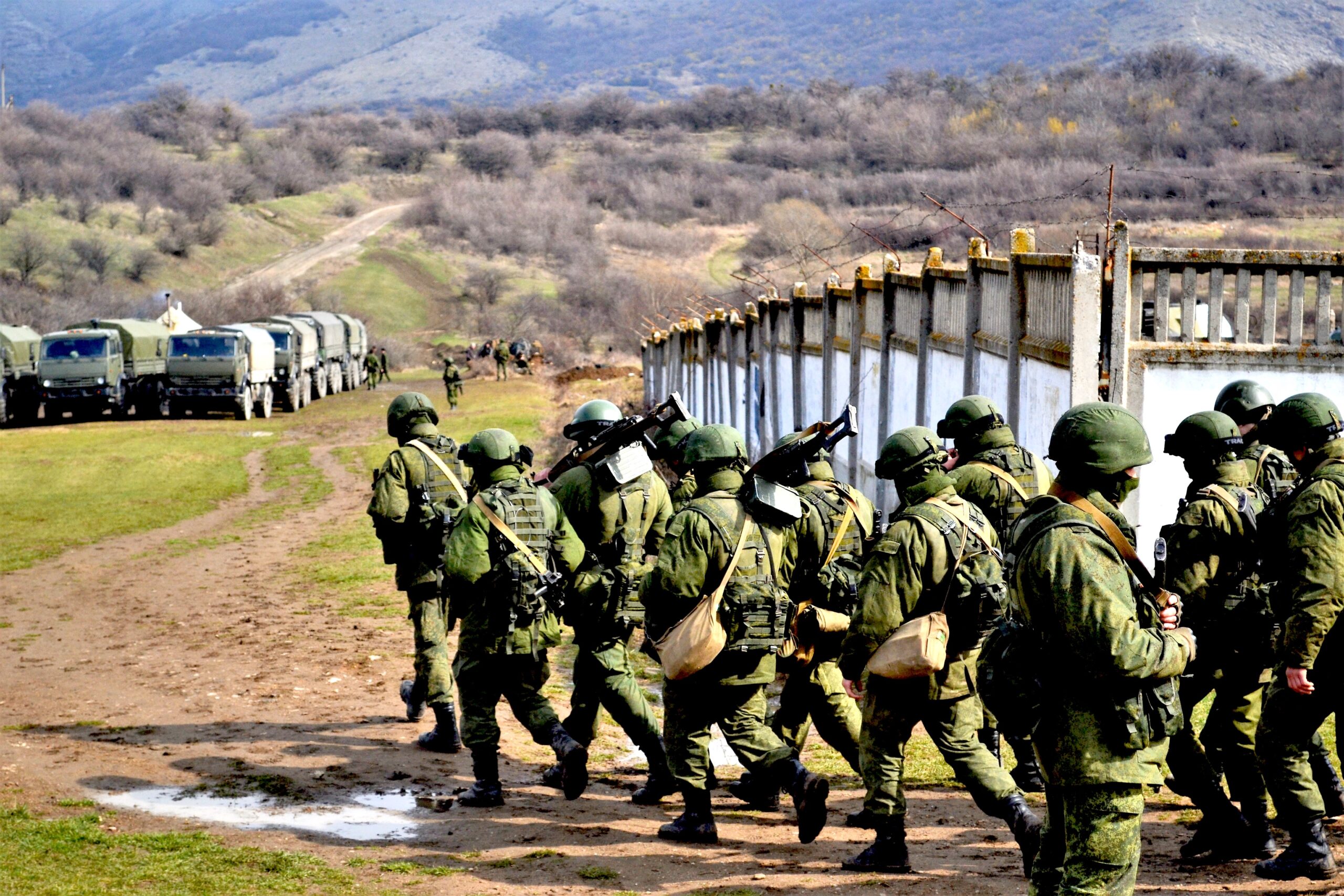After the fall of the Soviet Union, there was a near universal understanding among political leaders that NATO expansion would be a foolish provocation against Russia. The military-industrial complex would not allow such sanity to prevail.

Nov. 26, 2014: Damaged building in Kurakhove, Donetsk, Ukraine. (VO Svoboda, CC BY 3.0, Wikimedia Commons)
By Chris Hedges
ScheerPost.com
 I was in Eastern Europe in 1989, reporting on the revolutions that overthrew the ossified communist dictatorships that led to the collapse of the Soviet Union. It was a time of hope.
I was in Eastern Europe in 1989, reporting on the revolutions that overthrew the ossified communist dictatorships that led to the collapse of the Soviet Union. It was a time of hope.
NATO, with the breakup of the Soviet empire, became obsolete. President Mikhail Gorbachev reached out to Washington and Europe to build a new security pact that would include Russia. Secretary of State James Baker in the Reagan administration, along with the West German Foreign Minister Hans-Dietrich Genscher, assured the Soviet leader that if Germany was unified NATO would not be extended beyond the new borders.
The commitment not to expand NATO, also made by Great Britain and France, appeared to herald a new global order. We saw the peace dividend dangled before us, the promise that the massive expenditures on weapons that characterized the Cold War would be converted into expenditures on social programs and infrastructures that had long been neglected to feed the insatiable appetite of the military.
There was a near universal understanding among diplomats and political leaders at the time that any attempt to expand NATO was foolish, an unwarranted provocation against Russia that would obliterate the ties and bonds that happily emerged at the end of the Cold War.
How naive we were. The war industry did not intend to shrink its power or its profits. It set out almost immediately to recruit the former Communist Bloc countries into the European Union and NATO. Countries that joined NATO, which now include Poland, Hungary, the Czech Republic, Bulgaria, Estonia, Latvia, Lithuania, Romania, Slovakia, Slovenia, Albania, Croatia, Montenegro, and North Macedonia were forced to reconfigure their militaries, often through hefty loans, to become compatible with NATO military hardware.
No Peace Dividend

Nov. 19, 1985: U.S. President Ronald Reagan and Soviet General Secretary Gorbachev in Geneva for their first summit. (Reagan White House, Wikimedia Commons)
There would be no peace dividend. The expansion of NATO swiftly became a multi-billion-dollar bonanza for the corporations that had profited from the Cold War. (Poland, for example, just agreed to spend $6 billion on M1 Abrams tanks and other U.S. military equipment.)
If Russia would not acquiesce to again being the enemy, then Russia would be pressured into becoming the enemy. And here we are. On the brink of another Cold War, one from which only the war industry will profit while, as W. H. Auden wrote, the little children die in the streets.
The consequences of pushing NATO up to the borders with Russia — there is now a NATO missile base in Poland 100 miles from the Russian border — were well known to policy makers. Yet they did it anyway. It made no geopolitical sense. But it made commercial sense. War, after all, is a business, a very lucrative one. It is why we spent two decades in Afghanistan although there was near universal consensus after a few years of fruitless fighting that we had waded into a quagmire we could never win.

March 9, 2014: Russian troops after the seizure of the military base at Perevalne during the occupation of Crimea and the city of Sevastopol. (Anton Holoborodko, CC BY-SA 3.0, Wikimedia Commons)
In a classified diplomatic cable obtained and released by WikiLeaks dated Feb. 1, 2008, written from Moscow, and addressed to the Joint Chiefs of Staff, NATO-European Union Cooperative, National Security Council, Russia Moscow Political Collective, secretary of defense and secretary of state, there was an unequivocal understanding that expanding NATO risked an eventual conflict with Russia, especially over Ukraine.
“Not only does Russia perceive encirclement [by NATO], and efforts to undermine Russia’s influence in the region, but it also fears unpredictable and uncontrolled consequences which would seriously affect Russian security interests,” the cable reads and continues:
“Experts tell us that Russia is particularly worried that the strong divisions in Ukraine over NATO membership, with much of the ethnic-Russian community against membership, could lead to a major split, involving violence or at worst, civil war. In that eventuality, Russia would have to decide whether to intervene; a decision Russia does not want to have to face. . . . Dmitri Trenin, Deputy Director of the Carnegie Moscow Center, expressed concern that Ukraine was, in the long-term, the most potentially destabilizing factor in U.S.-Russian relations, given the level of emotion and neuralgia triggered by its quest for NATO membership . . . Because membership remained divisive in Ukrainian domestic politics, it created an opening for Russian intervention. Trenin expressed concern that elements within the Russian establishment would be encouraged to meddle, stimulating U.S. overt encouragement of opposing political forces, and leaving the U.S. and Russia in a classic confrontational posture.”
The Obama administration, not wanting to further inflame tensions with Russia, blocked arms sales to Kiev. But this act of prudence was abandoned by the Trump and Biden administrations. Weapons from the U.S. and Great Britain are pouring into Ukraine, part of the $1.5 billion in promised military aid. The equipment includes hundreds of sophisticated Javelins and NLAW anti-tank weapons despite repeated protests by Moscow.
The United States and its NATO allies have no intention of sending troops to Ukraine. Rather, they will flood the country with weapons, which is what it did in the 2008 conflict between Russia and Georgia.
‘I have asked 27 European leaders whether Ukraine will be in NATO …. Everyone is afraid, no one answers,’ Ukrainian President Volodymyr Zelenskiy said in a late night speech https://t.co/Tco566qKpI pic.twitter.com/LZFRh6WM7f
— Reuters (@Reuters) February 25, 2022
The conflict in Ukraine echoes the novel Chronicle of a Death Foretold by Gabriel Garcia Marquez. In the novel it is acknowledged by the narrator that “there had never been a death more foretold” and yet no one was able or willing to stop it.
All of us who reported from Eastern Europe in 1989 knew the consequences of provoking Russia, and yet few have raised their voices to halt the madness. The methodical steps towards war took on a life of their own, moving us like sleepwalkers towards disaster.
Once NATO expanded into Eastern Europe, the Clinton administration promised Moscow that NATO combat troops would not be stationed in Eastern Europe, the defining issue of the 1997 NATO-Russia Founding Act on Mutual Relations. This promise again turned out to be a lie.
Then in 2014 the U.S. backed a coup against the Ukrainian President Viktor Yanukovych who sought to build an economic alliance with Russia rather than the European Union. Of course, once integrated into the European Union, as seen in the rest of Eastern Europe, the next step is integration into NATO. Russia, spooked by the coup, alarmed at the overtures by the EU and NATO, then annexed Crimea, largely populated by Russian speakers. And the death spiral that led us to the conflict currently underway in Ukraine became unstoppable.
The war state needs enemies to sustain itself. When an enemy can’t be found, an enemy is manufactured. Russian President Vladimir Putin has become, in the words of Sen.Angus King, the new Hitler, out to grab Ukraine and the rest of Eastern Europe. The full-throated cries for war, echoed shamelessly by the press, are justified by draining the conflict of historical context, by elevating ourselves as the saviors and whoever we oppose, from Saddam Hussein to Putin, as the new Nazi leader.
I don’t know where this will end up. We must remember, as Putin reminded us, that Russia is a nuclear power. We must remember that once you open the Pandora’s box of war it unleashes dark and murderous forces no one can control. I know this from personal experience. The match has been lit. The tragedy is that there was never any dispute about how the conflagration would start.
Chris Hedges is a Pulitzer Prize–winning journalist who was a foreign correspondent for 15 years for The New York Times, where he served as the Middle East bureau chief and Balkan bureau chief for the paper. He previously worked overseas for The Dallas Morning News, The Christian Science Monitor and NPR. He is the host of the Emmy Award-nominated RT America show “On Contact.”
This column is from Scheerpost, for which Chris Hedges writes a regular column. Click here to sign up for email alerts.
The views expressed are solely those of the author and may or may not reflect those of Consortium News.

Thank you Chris Hedges for this insightful piece. Within it, we find another example of just how valuable the contributions of WikiLeaks and Julian Assange are to our understanding of US geopolitical machinations.
Thank you also for your appearance at the Belmarsh Tribunal yesterday. A link is below. Mr. Hedges’ remarks begin at the 1:38:12 mark in the video.
hxxps://www.youtube.com/watch?v=Tp8b6U3Pvlk
A vert fine piece, and short as well. Russia and the USSR have been the target of western aggression for many centuries, starting if I remember correctly in the twelfth century when Russia was invaded by the German Teutonic Knights. The Russian triumph in that conflict produced, among other things, Prokofief’s wonderful cantata, written during the second world war as the Soviet Union fought against the Nazis. Napoleon’s failure on the outskirts of Moscow led Tchaikowsky to write his famous 1812 Overture. In the 18th century there was the invasion of Russia by the Polish-Lithuanian kingdom, in the 19th the battle in Crimea between the Turkish-British Alliance and Russia. In the 1990s there was the Clinton attempt to make Russia a subsidiary of the US, which produced a poverty rate in Russia of 70 percent. Nuland went to Moscow to tell Lavrov we don’t give a damn for your security. Bow it’s Putin’s turn to save Russia. May he succeed!!
r
Thanks Chris, seems like you and Joe Lauria are of the few willing to
confront the “beast” (Rev.13.4), America’s war industry. Others of their so-called
pro-peace, anti- racism and anti-Trump fascism have gone over to the
propaganda of the military-industrial complex media, finding a comfortable
consensus in the lie.
“The best lack all conviction, while the worst/Are full of passionate intensity”
(W.B. Yeats, “Second Coming”).
St. Augustine’s “Just-War theory clearly puts Putin on side of justice: America’s
thirty years of injustice (J. Lauria’s piece), give Russia the right to protect innocent life,
using violence to bring peace. Putin has already said he’ ready for talks while Ukraine’s president
is worshiping his “heroes” and asking for more NATO (U.S.) weapons.
Some of those “best” by supporting the American war machine are greasing the
axles for Trump in 2024, and a Republican Party Congress in 2022.
So far Russia has kept the casualties minimal, under 200 casualties at Ukraine’s last report in the destruction of the military equipment of an entire nation! That must be a record low, less than one percent of typical US interventions. Clearly they will avoid a quagmire like Afghanistan and back off to independent provinces as they did in Georgia.
Russia is unlikely to go much further than broader protection of Donbass:
1. Destruction of military equipment, command and control centers;
2. Defeat of the Kiev government without occupation of Kiev or other major cities;
3. Surrounding and defeat or capture of the Ukraine forces attacking Donbass;
4. Setting up bases and structure to protect newly independent provinces.
The question is which provinces want to be independent, and how to determine that:
1. Odessa probably wants independence, but southern provinces between them and Luhansk/Donetsk are less Russian;
2. Russia may want to control the coastal provinces linking Donetsk to Odessa (Mykolaiv, Kherson, Zaporizhia);
3. So retaining forces there limits weapons and import/exports of Ukraine during referenda on independence;
4. But if Russia knows the south coastal provinces do not want independence, it may have to forego Odessa.
The most frightening thing is that once things start on the road to war there is no turning back. Washington has been drawing lines in the sand for weeks, daring the Russias to attack. Attacks that are really not attacks are nevertheless played in the media as such. One thinks of children playing on a playground and this is what it ultimately turns into. The West (the United States)as a parent to a child says,”do or don’t do that or I’ll punish you!” This is a dare. This approach always gets the opposite result: “No, I won’t.” What this does is let the other party off the hook, a result, in the end, that is expected anyway. Thus, the evil Russians are at fault for not obeying their betters. Dialogue, true dialogue and discussion with another party must start with respect for the other party’s position or point of view. This, tragically, has been absent all along.
Putin has no choice. There is nowhere else to retreat to.
I wished people watching MSNBC in the US would read your articles (the other branch may be too nationalistic to be objective). There was an interesting interview on DemocracyNow of Ambassador Jack Matlock which is in agreement with you (easier to redistribute, because they can just watch instead of the “insurmountable” act of reading;) . Looking at “progressive” YouTube outlets, a lot of them follow the line Russia bad, Ukraine good. The analysis doe not go beyond that, they question people saying that NATO is at fault and responsible for the killings in Ukraine. As you said, this narrative goes along with the objectives of arm dealers. A lot of people that grew up in the 80s and 90s forgot about the disaster that was the Neo-liberal policy in Russia, the decrease in life expectancy, the difficulty to find jobs or get a salary (a lot of military secrets were for sale, a dangerous period) and the rise of the Russian mafia (blue and white collars). Let’s not forget that like in China, many of the new capitalists were former high and medium ranking officials. Two groups emerged from this mess, one that saw its interests best served with an association with the western Neo-liberals and another that wanted a more “local” type of market corruption. Yeltsin decided in favor of the latter by choosing Putin as his successor. That meant the institution of a soft dictature for the Russian (with the corruption that goes with it), a lost of Western influence in Russian internal affairs (watch Amazon’s documentaries with a critical mind), but with concomitant rise in quality of life Much less people were drinking themselves to death and a patriotic (to nationalistic, depending on the person) movement emerged. In short, the West, instead of accepting Russia as a full partner — as the latter expected — wanted a subservient subject, with full and open access to its resources, no matter the social cost (Irak!?!). A similar approach occurred with China, which was supposed to be and stay the manufacturing house of western Neo-liberal corporations. That failed miserably. China is on its way to become an independent financial and manufacturing power, as Russia is following its own path. Russia, China, Afghanistan, Irak, Lybia, Syria,… are so many long term failure and this people do not put themselves in question. China is an Evil that must be contained (nuclear superpower) as is Russia (nuclear superpower). The only way out is their way and it will happen by force (this is where arm dealers and the rest of the merchants find a common ground). There is more to it of course, the opinion of analysts like Ray McGovern would be welcome.
Thank you. This is true.
Thanks to Chris Hedges for this great piece. The quote from the Feb 2008 diplomatic cable is invaluable. It is obvious to anyone who cares to think about Russia as a legitimate nation-state that NATO expansion was dangerous and delusional. A minor correction: I don’t believe there is any point of Poland within 100 miles of Russia’s border. Three hundred is more like it.
Thank you, Chris Hedges, voice in the wilderness . . . clearly explaining the history leading to the present situation between Russia and the West (i.e. NATO expansion) . . . reminder of Cuban missile crisis i.e. U.S. confrontation with Soviets . . . in no way would we (the West) allow weapons and troops within striking distance of our country . . . double standard for sure . . . You explain this history in such a vital way. If only the mass media allowed your voice.
So far Russia has kept the casualty reports minimal, under 200 Ukraine casualties at last report in the destruction of the military equipment of an entire nation! That must be a record low, less than one percent of a typical US interventions. Clearly they will avoid a quagmire like Afghanistan and back off to independent provinces as they did in Georgia.
Russia is unlikely to go much further than broader protection of Donbass:
1. Destruction of military equipment, command and control centers;
2. Defeat of the Kiev government without occupation of Kiev or other major cities;
3. Surrounding and defeat or capture of the Ukraine forces attacking Donbass;
4. Setting up bases and structure to protect newly independent provinces.
The question is which provinces want to be independent, and how to determine that:
1. Odessa probably wants independence, but southern provinces between them and Luhansk/Donetsk are less Russian;
2. Russia may want to control the coastal provinces linking Donetsk to Odessa (Mykolaiv, Kherson, Zaporizhia);
3. So retaining forces there limits weapons and import/exports of Ukraine while during referenda on independence;
4. But if Russia knows the south coastal provinces do not want independence, it may have to forego Odessa.
Finally, somebody wrote something about the current madness that I can understand. I’m not surprised it was you, Mr. Hedges, and I thank you.
As I noted before with regard to Venezuela, the coordination of our American corporate press is amazing:
The Wurlitzer is mightier than ever.
Usually there is a pattern to the madness but in this case it is a madness that is trying to catch up with the pattern. In otherwords Putin is proving his rationality by going constructively rogue !
Chapeau!
The US reached all it s major objectives.
1. Stopping Russian integration within the EU. The EU with Russia would not only be the biggest economic power on the planet but also the militarily equal to the US.
2. Getting EU back in line. After losing its EU Lapdog “Britain” they now can rely on frightened eastern European countries to do their bidding, and thereby direct the political decision making process in Brussels. (Because only the US can protect them from evil Russians)
3. Sell lots of weapons to eastern Europe. Sacrificing Ukraine makes the sales pitch even stronger, saying you can only rely on yourself, so you need these weapons.
Saying this I think one can say that the US has a strategy. After eight years of preparation I am sure that Russia has a strategy too.
Does anyone want to bet wether the European union has a strategy?
I appreciate this well-written, well-reasoned history of the crisis. The media and internet and political opportunists and war profiteers seem to be doing all they can to stoke the growing conflagration, it feels like we are being pulled down into this hellish conflict on the other side of the planet by some sinister undertow into more and more involvement with the war. God help us if Putin becomes unhinged and provoked too far.
There appear to be no sane heads in Washington — personally sanctioning Putin and Lavrov obviously severs diplomatic relations. Severed diplomatic relations historically has been a prelude to war. Washington knows it would be annihilated in a ground war against Russia, ergo the battles would spiral into nuclear war very quickly.__
Across the entire political spectrum in the U.S. — from the liberals to the crazy neo-cons — it’s all Russophobic diatribes all day, all night from every single mainstream media source. Any intelligent rational analysts who attempt to present the reasonable Russian position are immediately deemed Kremlin propagandists and dismissed.
This is a dangerous groupthink that somehow must absolutely be overcome!
Obviously right now Shoigu is refraining from targeting the neo-Nazis and militias holed up amidst civilian populations in urban areas bc the civilian casualties would be very heavy. If the NATO/Washington-Zio-militarist empire keeps egging on these rightwing fascists and militias all bets are off and Russia may have to go in and clean out the problem.
The Russophobic blather is sickening. A knee-jerk reaction on all fronts. The so-called “progressives” are braying the loudest for war.